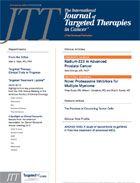HER2 Expression Level Associated With Response to T-DM1 in HER2+ Metastatic Breast Cancer
High levels of HER2 expression in metastatic breast cancer tumors correlated with increased benefit from treatment with adotrastuzumab.
José Baselga, MD, PhD
High levels of HER2 expression in metastatic breast cancer tumors correlated with increased benefit from treatment with adotrastuzumab (T-DM1), according to a subanalysis of data from the phase III EMILIA trial. However,PIK3CAmutations had no effect on response to T-DM1 but did interfere with response to capecitabine/lapatinib. The results of the subanalysis were presented at AACR 2013 by José Baselga, MD, PhD, physicianin- chief at Memorial Sloan-Kettering Cancer Center in New York City.
In the landmark EMILIA trial, which led to the approval of T-DM1, patients with HER2-positive metastatic breast cancer previously treated with trastuzumab were randomized to T-DM1 or capecitabine plus lapatinib. The antibody-drug conjugate (ADC) T-DM1 significantly improved progression-free survival (PFS) and overall survival (OS).
In the subanalysis presented at AACR, Baselga and colleagues analyzed prospectively collected tissue samples from participants in EMILIA for expression ofEGFR, HER2 mRNA, andPIK3CA. The analysis correlated PFS, and then the amount of HER2 mRNA expression andPIK3CAmutation frequency with PFS and OS. Median HER2 mRNA concentration ratios andPIK3CAmutation frequencies were similar across all treatment arms.
T-DM1 achieved superior PFS and OS in all biomarker subgroups. However, tumors that expressed high HER2 mRNA levels had better outcomes compared with those with lower levels of expression. In the high expressors, median PFS was 34.1 months with T-DM1 versus 24.8 months with capecitabine/lapatinib.
The presence ofPIK3CAmutations led to worse outcomes in patients treated with capecitabine/lapatinib compared with wildtypePIK3CA. Those with mutations had shorter OS by a mean of 10 months versus wild-typePIK3CA. The presence ofPIK3CAmutations had no effect on PFS or OS in the T-DM1 arm.
The presence ofPIK3CAmutations has been associated with resistance to trastuzumab in HER2-positive breast cancer. “Unlike other HER2-directed therapies, T-DM1 isPIK3CAmutation neutral,” Baselga said.
HER2-positive breast cancer is heterogeneous, and Baselga considers the findings of the biomarker study important. “These data will help us as we identify a panel of molecular features that we can use to make informed treatment decisions,” he said.
Louis M. Weiner, MD
“Our results are not practice-changing at this point,” Baselga said. “It is possible that patients with high HER2 expression may not need chemotherapy if treated with T-DM1, but that is speculation and would need to be studied.”
Compounds that targetPIK3CAcould be an option for HER2- positive patients with these mutations, but further study is needed, he said.
T-DM1 may find a role earlier in the course of breast cancer. Ongoing studies are evaluating the ADC as adjuvant therapy and as first-line therapy for metastatic disease.
Other novel ADCs are being studied in solid tumors. Moderator of the AACR press conference where these findings were presented, Louis M. Weiner, MD, director of the Georgetown University Lombardi Comprehensive Cancer Center, Washington, DC, said, “The lessons of T-DM1 are not unique to T-DM1, but to other antibodydrug conjugates as well. The therapeutic concept of antibody-drug conjugates makes sense. Target the antigen on the cell surface, and deliver powerful cytotoxic chemotherapy. The antibody delivers the potent drug that could not be given otherwise to exactly where it needs to go.”

Biomarker Testing Paves the Way for Better Targeted Therapies in NSCLC
April 16th 2024At a live virtual event, Edward S. Kim, MD, MBA, discussed the evolving landscape of biomarker testing before making treatment decisions for patients with early-stage non–small cell lung cancer (NSCLC).
Read More
Breast Cancer Leans into the Decade of Antibody-Drug Conjugates, Experts Discuss
September 25th 2020In season 1, episode 3 of Targeted Talks, the importance of precision medicine in breast cancer, and how that vitally differs in community oncology compared with academic settings, is the topic of discussion.
Listen